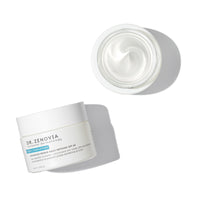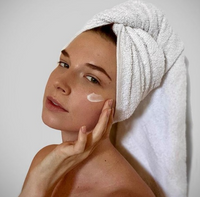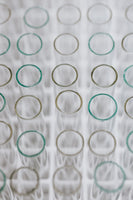Hyaluronic Acid: Skin Benefits + How to Use

Hyaluronic Acid Skin Benefits
Hyaluronic Acid (HA) is a clear, gooey-like substance that is naturally produced by our cells. The largest amounts of hyaluronic acid can be found in the skin, connective tissues, and eyes. As a humectant, hyaluronic acid helps retain moisture to keep our tissues well lubricated- it can hold many times its weight in water! This powerful molecule helps improve skin hydration, reducing the appearance of fine lines and wrinkles while improving overall texture and skin smoothness.
Hyaluronic acid is known for achieving plump, younger-looking skin. However, as we age, our body’s production of HA decreases which can leave the skin looking dull. Replenishing moisture with serums and moisturizers that contain hyaluronic acid can help restore the appearance of healthy, hydrated skin. The formulation and chemistry of the HA is critical to being effective.
The Science Behind Fractionated Hyaluronic Acid
Hyaluronic acid is a very large, negatively charged molecule. For this reason, HA doesn’t penetrate the epidermis well. One of the key elements of hyaluronic acid in skincare products is that it must be fractionated- broken up into tiny pieces to be absorbable and effective. Most HA formulations on the market are not fractionated. Meaning, the hyaluronic acid is too big to cross the barrier of the skin so it floats on top of the tissue and doesn’t penetrate.
Hyaluronic acid penetrates deeper and more efficiently if the molecule if fractionated. Dr. Zenovia says to visualize the hyaluronic acid molecule like a sponge. As the water fills the sponge, the size of the sponge gets larger- more plump. Dr. Zenovia’s hyaluronic acid is highly fractionated so it bypasses the epidermis as a tiny, well-absorbed molecule. The tissue is then attracted to the other tiny particles that form a sponge-like substance that absorbs water, plumping and hydrating the tissue.
By fractionating the large hyaluronic acid molecule and mixing it with a stimulating peptide, the HA will be able to serve as a powerful hydrator and remain stable in the cell. Our chemists use high-grade raw materials and the recharge antioxidant, glutathione combined with the HA and peptides so that our serum becomes highly anti-oxidative, not just hydrating. If you formulate a hyaluronic acid product without a redundant, powerful antioxidant pathway it won’t be effective and will break down from the oxidative damage. By pairing Dr. Zenovia’s Hyaluronic Acid + Peptide Serum with an oxidative pathway (glutathione), the product won’t break down from oxidative damage. Our serum is a powerful hydrator and protector of your collagen.
How to Incorporate Hyaluronic Acid into Your Regimen
To combat skin dryness and a loss of elasticity, Dr. Zenovia recommends incorporating a hyaluronic acid serum and moisturizer into your nighttime skincare routine. Hyaluronic acid serums should be applied to the skin after cleansing, while the skin is still slightly damp. You can apply HA to the entire face or on targeted areas such as the neck or under-eye area. Applying a thin film of HA to the skin’s surface helps provide focused hydration that can help improve overall skin texture and smoothness.
Dr. Zenovia’s Hyaluronic Acid + Peptide Serum features fractionated hyaluronic acid and Dr. Zenovia’s exclusive phytoestrogen technology, the REG-ulate 360 Complex™. This cocktail of hydration with safe hormonal support gives the tissue a boost of moisture without oiliness and greasiness.
Post-Treatment Serum
Dr. Zenovia also loves the Hyaluronic Acid + Peptide Serum over derma-rollers, micro needling, or laser treatments. When the skin is “open” from lasers or other purposeful “trauma” an HA serum will help plump and boost skin hydration.
Dr. Zenovia’s Hyaluronic Acid + Peptide Serum can be used alone if you tend to be oily or can be layered with an additional moisturizer for added hydration. Our serum is safe for all skin types including acne and rosacea-prone skin.
Note from Dr. Zenovia: Hyaluronic acid rarely causes allergic reactions and is safe for those pregnant, breastfeeding, as well as for sensitive skin types. However, always patch test a new skincare product to ensure there is no sensitivity. Additionally, women who are pregnant or breastfeeding should always consult with their doctor before beginning a new skincare regimen.









Leave a comment